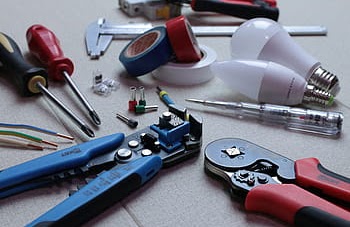.png)

An Electrician is a professional in the electrical field who fixes electrical problems. The electrician's job entails constant communication with customers. He must keep them informed about the progress of the job and explain the solutions to any questions they may have. In addition to communication with customers, an electrician needs to interact with other people, such as suppliers, subcontractors, and staff. Lack of communication can lead to wasted time and energy. Therefore, it is crucial to learn how to maintain good relations with these people.
The first step toward becoming an electrician is to complete an apprenticeship or state-approved training program. During training, the electrician is expected to study the national code for electricians. Many trade schools teach this to their students. After completion of the training, he can start studying for the electrician's license test. He may also take a test after accumulating his work experience. In any case, it is best to take the exam right after finishing training to ensure your license.
An important tool for any electrician is the multimeter. A multimeter measures the current strength in volts and can tell if there's a problem. The multimeter is an important tool for electricians as it is essential for performing electrical work. Moreover, it can help you assess whether the electrical system is functioning properly or not. The multimeter is a must-have tool in any electrician's kit. Ultimately, it is vital for any electrician to have a steady flow of clients.
In addition to electrical skills, a licensed electrician should have excellent communication skills. A multimeter is essential for an electrician. This device provides an indication of the strength of the current. It is also an invaluable tool for electricians because it is an excellent way to detect the source of an electrical problem. With proper training, an Electrician can become a successful businessman. If you're interested in a career in the electrical industry, don't miss this opportunity!
As an electrician, you can choose to work in residential or commercial buildings. You can work in offices or even outdoors on power systems. You can be an independent contractor or part of a larger construction team. You will need to pass a state exam before you can practice in the field. In addition to education, you must be certified. The National Electrical Contractors Association defines an electrician as a "Master" if he/she has passed an examination on the National Electrical Code.
An electrician is responsible for the installation and maintenance of electrical power. An electrician inspects the electrical components and uses testing equipment to determine the cause of problems. Sometimes, an electrician has to replace wiring or repair equipment. As an electrician, you may be asked to install and troubleshoot appliances or install wiring. Depending on the location, an electrician will likely be in a position with a high-paying salary and plenty of benefits.

An electrician's role is to maintain and install electrical power. He inspects electrical components and uses testing equipment to determine problems. He may be asked to replace wiring or repair equipment. An apprenticeship is typically four years long and involves two or three work placements. The job description may vary by location and type of company. The typical salary range for an electrician is $55,000 to $68,000. A license is required to work in the field, so an individual must pass a state exam to become eligible.
The industry continues to change, and electricians must remain up to date with new technologies. Solar energy is becoming popular, and electricians may be called upon to install solar panels on roofs. The LAN cable and fiber-optic technologies are relatively new, and electricians must adapt to these new technologies and situations. If you are good at problem-solving and can keep customers informed, you may be able to land more jobs and leave a trail of satisfied customers.
While you don't have to attend a vocational-technical school to become an electrician, this type of training can be beneficial. A training program can help you get certification and land your first job. An apprenticeship will also help you understand how electrical equipment and systems work, and will expose you to the fundamentals of electricity and electrical safety. You'll be better equipped to handle unexpected challenges and work on your own. You'll be able to earn more money and build a great reputation among your clientele.
An electrician's job requires physical strength and stamina. Heavy components, such as switches, electrical wires, and motors, can weigh up to fifty pounds. If you're up to the challenge, you'll need to know how to troubleshoot electrical systems and use the proper diagnostic equipment. This will help you get more work and create a trail of happy customers. The most rewarding electricians are those who can create positive customer experiences and referrals.
An electrician's job is not a highly technical profession. However, it requires good communication skills and a good understanding of science and mathematics. As an electrician, you will need to know the various electrical codes and standards. For this, you'll need to know the National Electrical Code and be able to use it. You'll also need to learn how to read and interpret blueprints. You can use online resources to find electricians in your area.
An electrician's job involves repairing and installing electrical equipment and systems. In addition to wiring, an electrician may repair motors, generators, and electronic controls on machines. An electrician may also consult with other technicians in the same field, such as engineers and industrial machinery mechanics. Those with good hands and good eyesight will be in demand in a variety of industries. A professional working in the field of electrical work must be able to manage his or her time efficiently and be able to follow safety guidelines.

If you are interested in working in the field of electrical engineering, an Electrician degree could be just what you're looking for. This type of trade includes installing and maintaining electrical power systems. In addition, electricians may use various testing equipment to diagnose problems and to repair or replace wiring and other equipment. This job requires you to understand all aspects of electricity. As an apprentice, you can begin working on your apprenticeship at a local college or trade school.
An Electricalian can be in any field. Some work in industrial settings, while others work on a residential or commercial level. An electrician must understand the dangers of electricity and learn about the safety regulations around it. There are also several different specializations for an electrician. For example, industrial electricians focus on large-scale projects and domestic electricians focus on smaller, more intimate installations. There are also different training requirements for each type of electrician.
As electricity became more prevalent, the demand for electricians grew. As a result, electricians were sought after in all parts of the world. Because of this, an electrician's career development is constantly changing. They are continually trying to improve the way devices function and are used. This requires advanced problem-solving skills, which are essential to the success of any electrical contractor. Once a professional has become an expert in a particular field, they can become a licensed electrical engineer.
A specialized electrician is trained in electrical wiring of buildings, transmission lines, and other stationary machines and equipment. They can also specialize in wiring airplanes, ships, and mobile platforms. They may even specialize in data and cable lines. This is an exciting career path. While you might not be able to make your own home, it is still possible to make money as an electrician. With the right training, you'll be able to establish a lucrative and rewarding business in this field.
In the late century, lighting systems became more common in homes, and the demand for electricians skyrocketed. In the century, however, lighting systems became a mainstay of daily life, and the needs of individuals and businesses increased. Many electrical professionals now specialize in different areas of electrical work, ranging from residential to industrial to new technologies. The demands of these technicians grew dramatically with the introduction of electricity in the century.
By the end of the century, lighting systems had become common in most homes. The advent of electricity meant that the need for electricians had increased dramatically. There were now three kinds of electricians: some specialized in large-scale systems, others in small-scale circuits, and some in modern technologies. By the end of the century, electricity became a staple in most people's lives. The demand for electricians grew exponentially as the technology continued to evolve.
Member Spotlight
Bates Electric
2233 49th Ave N, Suite 145
Minneapolis, MN 55430
763-296-3358
https://bates-electric.com/locations/minneapolis-mn/
https://goo.gl/maps/FrJjLhR3HnhTRMwWAElectricians
Minneapolis will install new items such as fridges and washing machines, which will allow you to save money in the long run. This is especially true if you are not going to be using these appliances very often.
The Electrician Commerce Group is an extremely professional organization, which has literally been around for decades. With an outstanding team of full-time electrical engineers on its payroll, the Electrician Commerce Group really is one of the strongest-known names in the electrical industry and constantly puts the consumer first by putting safety first. The Electrician Commerce Group also boasts a nationwide network of members that are willing to work side by side with one another to come up with innovative solutions to clients all over the country.